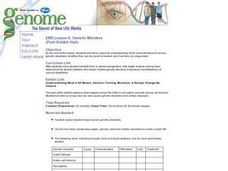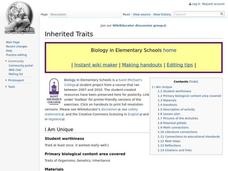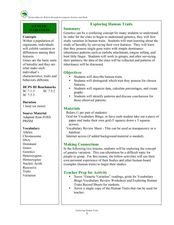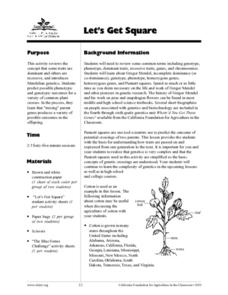University of Georgia
Monohybrid Crosses and The Punnett Square Lesson Plan
Looking for a quick, hands-on activity to teach young scientists about Punnett squares through monohybrid crosses? then check out this one.
Curated OER
Teacher Preparation Notes on Genetics
Students explore genetics through various hands-on activities. In this biology lesson, students predict the probability of offspring genotypes and phenotypes using the Punnett Square. They explain the causes of genetic abnormalities.
Curated OER
Heredity (Mendelian Genetics)
Students observe and record observations of whether a person is a taster or nontaster. They test selected individuals from their families and peer groups and chart all findings to determine which trait (e.g. taster or non-taster) is...
Curated OER
Super Hero Genetics
Students explore the concepts of phenotypes and genotypes. For this genetics lesson students work together to pick a superhero and determine the traits of the offspring.
Curated OER
Human Heredity Traits
Completing an idea map based on various inheritance factors and mistakes, 9th graders review their knowledge of genetic disorders. While the activity is based on chapter 15 of an unnamed textbook, the questions at the bottom of the page...
Curated OER
Introduction to Mendelian Genetics using Fiction
Learners investigate Mendelian Genetics by studying the history of Mendel and what it was like to be a 19th century scientist. They read a pieces of fiction during this investigation.
Curated OER
Genetic Mistakes
Learners explore genetic disorders. They examine the genetic structure to physicial manifestations of various disabilities. Using internet sources, students analyze the characteristics of genetic disorders, whether they can be cured or...
Curated OER
Genetically Modified Foods
High schoolers explain what genetically modified foods are and how they are created. Students use appropriate vocabulary to describe and effectively discuss the benefits of, and potential risks of, genetically modified foods.
Curated OER
Mice Rule!
Pupils explain what biodiversity is and how adaptive features are maintained in a population. In this biodiversity instructional activity students complete a simple activity involving mouse populations.
Curated OER
Basic Ideas of Inheritance
Students enter personal information into a database. The information is used to reinforce the ideas of inheritance that is found in 1st Grade Science. Access to technology is essential for this lesson. Adding the use of a mirror for...
K20 LEARN
More than Skin Deep
From crime to paternity, DNA fingerprinting has revolutionized how the world views inherited traits. Science sleuths investigate the facts about DNA profiling through a variety of activities. The Teacher's Guide includes printable...
Curated OER
Solving Genetic Puzzles
Seventh graders examine genetics combination using statistics. In this statistics lesson, 7th graders examine genetic trait using a table or punnett square to identify genotype and phenotype. This assignment requires more than one class...
Curated OER
Lesson 14: Genetic Disorders
Students create PowerPoint presentation on the topic they researched. In this biology lesson, students fill out a storyboard about their topic. They share their project in class.
Agriculture in the Classroom
Roll of the Genes
Animal reproduction in sheep and cattle is explored with the help of Punnet squares. Scholars employ tools using probability to conclude the color of wool a sheep's offspring will have. Acting as animal geneticists, pupils then take...
Curated OER
Artificial Selection
The second lesson in the series begins with a starter activity discussing wild versus domesticated animals. Then, scholars play a card game, with optional variations, to emphasize artificial selection. Next, they attend a field trip to a...
Curated OER
I Am Unique
Students study traits of organisms including genetics and inheritance. In this genetic traits activity, students complete a shared reading and discuss the 6 traits of uniqueness. Students sort themselves by specific traits and chart...
Curated OER
Survivors on the Ocean Ridge
High schoolers discover the uniqueness of deep sea hydrothermal vent organisms through an exploration of the NOAA Galapagos Rift Expedition. They study the genetics and evolution of a shrimp species that lives near the vents then they...
Curated OER
Family Pedigrees
Pupils work as a class to first construct a pedigree of a popular singer, showcasing the singing gene being passed down through the generations. Students then make their own family pedigree and follow two traits through their family lines.
Howard Hughes Medical Institute
The Making of the Fittest: Got Lactase? The Co-evolution of Genes and Culture
Got milk? Only two cultures have had it long enough to develop the tolerance of lactose as an adult. Learn how the responsible genes evolved along with the cultures that have been consuming milk. This rich film is supplied with a few...
Curated OER
Exploring Human Traits
Students explore human behavior by participating in a class science game. In this human characteristics instructional activity, students identify different human traits that are passed down by each generation and the purpose each of them...
Curated OER
Let's Get Square
Students predict possible phenotypic and genotypic outcomes for avariety of common plant hybrids. They review and explain the characteristics of dominant and recessive traits and explore Mendelian genetics. Students plot the possible...
Curated OER
Taster or Non-Taster?
Learners conduct a simple experiment to determine if a trait has been passed from a family member to them.
Curated OER
TE Lesson: What's Dominant?
Students study the number of chromosomes in the body cells, sperm cells, and egg cells of humans. They define allele, and examine the difference between dominant and recessive alleles. They complete an activity with jelly beans that...
Curated OER
Parental Genes
Eighth graders explore how different organisms pass their traits to their offspring. In this life science lesson, 8th graders differentiate recessive and dominant alleles. They predict the phenotype based on the genotype of an organism.

























